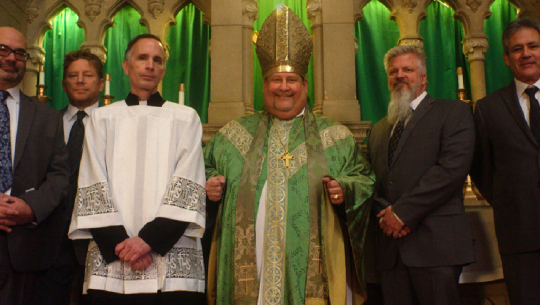This time around I went back to MoMA to watch a film by Robert Greene called Procession, a documentary film filled with cinema drama therapy that takes a different approach for a healing process of six adult survivors of child sex abuse in the Catholic church. The opening of the film was unlike anything I’ve ever seen, it had the re-enactment of one of the survivor’s stories but more than that it used CGI to alter the reality and give it a more symbolic meaning. I’ve watched many documentaries over the years, and Greene gave it such an experimental touch that it doesn’t feel like I was watching one at all. Firstly, the involvement of the survivors themselves taken control of the film and being the ones to narrate it all as well as being the ones to play acting roles on their own traumatic scene felt unique.

The topic of child molestation and rape inside the Catholic church is criticized in the media but worst of all, the Catholic church has been known for protecting its members. I felt immersed with the film from the beginning because I also come from a family that practices Catholicism, was baptized as a baby, did my first communion, and went to Sunday church with my family. As a child we’re made to follow the religion of our parents and as one of the survivor’s said, “the Church holds power on us the moment we’re baptized”, there’s something almost wrong about how true his words are and how the Church continues to be corrupted to this day. I’m not a religious person anymore but this film didn’t badmouth religion or for that matter none of the survivors were anti-religious instead they focused on the people itself.
Usually, while watching a documentary there’s this strategized almost beginning like timeline of the events that happened following up with interviews of the people involved and fictional scenes to recreate the event with different actors. But there wasn’t anything like that in the film instead the stories of the survivors were told as they talked casually and while writing and reviewing their scenes with one another. It felt almost too personal for a documentary, the men had control over their scenes, and they played the role of the perpetrators too. Drama therapy was something I’ve never heard of especially being shown in a documentary film, the approach that Greene took made the topic even more raw.
The film although shown as a documentary didn’t feel like it was one fully because of the behind the scenes being shown in its reality. It was more of a nonfiction film about healing and that’s what Greene is known for as a filmmaker of modern nonfiction cinema. The ending as well was one of the survivor’s reading a letter to his younger self (the child actor) where he writes how he will move on and that it wasn’t his fault. It all ties together with what they want the film to mean for them and the future and to all the other young boys who share the same story as them. All six men knew the documentary film would either be received good or bad but what mattered most was to get their story out. Greene’s used experimental directing and filming to give the survivors a chance to heal on their own film.
Yoselin Castelan Ramirez